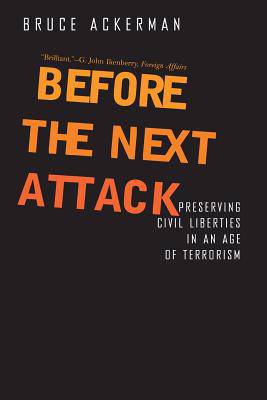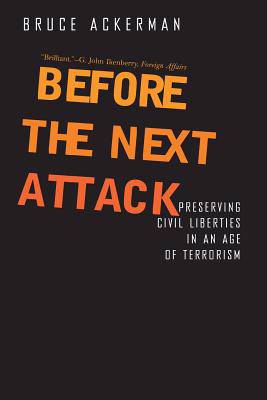
- Afhalen na 1 uur in een winkel met voorraad
- Gratis thuislevering in België vanaf € 30
- Ruim aanbod met 7 miljoen producten
- Afhalen na 1 uur in een winkel met voorraad
- Gratis thuislevering in België vanaf € 30
- Ruim aanbod met 7 miljoen producten
Zoeken
Before the Next Attack
Preserving Civil Liberties in an Age of Terrorism
Bruce Ackerman
Paperback | Engels
€ 57,95
+ 115 punten
Omschrijving
Terrorist attacks regularly trigger the enactment of repressive laws, setting in motion a vicious cycle that threatens to devastate civil liberties over the twenty-first century. In this clear-sighted book, Bruce Ackerman peers into the future and presents an intuitive, practical alternative. He proposes an "emergency constitution" that enables government to take extraordinary actions to prevent a second strike in the short run while prohibiting permanent measures that destroy our freedom over the longer run. Ackerman's "emergency constitution" exposes the dangers lurking behind the popular notion that we are fighting a "war" on terror. He criticizes court opinions that have adopted the war framework, showing how they uncritically accept extreme presidential claims to sweeping powers. Instead of expanding the authority of the commander in chief, the courts should encourage new forms of checks and balances that allow for decisive, but carefully controlled, presidential action during emergencies. In making his case, Ackerman explores emergency provisions in constitutions of nations ranging from France to South Africa, retaining aspects that work and adapting others. He shows that no country today is well equipped to both fend off terrorists and preserve fundamental liberties, drawing particular attention to recent British reactions to terrorist attacks. Written for thoughtful citizens throughout the world, this book is democracy's constitutional reply to political excess in the sinister era of terrorism.
Specificaties
Betrokkenen
- Auteur(s):
- Uitgeverij:
Inhoud
- Aantal bladzijden:
- 240
- Taal:
- Engels
Eigenschappen
- Productcode (EAN):
- 9780300122664
- Verschijningsdatum:
- 1/03/2007
- Uitvoering:
- Paperback
- Formaat:
- Trade paperback (VS)
- Afmetingen:
- 165 mm x 227 mm
- Gewicht:
- 326 g

Alleen bij Standaard Boekhandel
+ 115 punten op je klantenkaart van Standaard Boekhandel
Beoordelingen
We publiceren alleen reviews die voldoen aan de voorwaarden voor reviews. Bekijk onze voorwaarden voor reviews.











